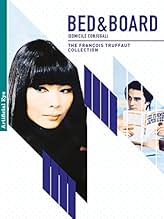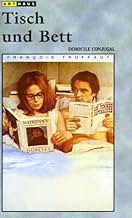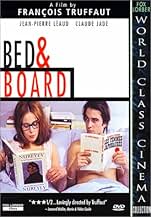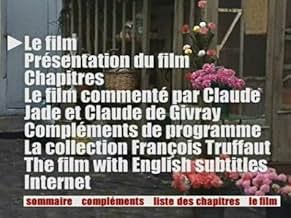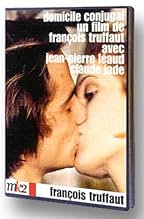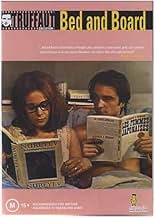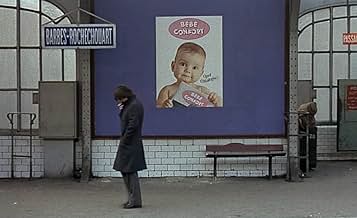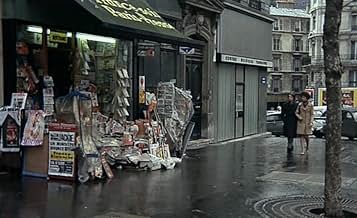Adicionar um enredo no seu idiomaAntoine Doinel works dying flowers in the courtyard outside his apartment. He is married to Christine, who is pregnant. He has an affair with a Japanese woman, jeopardising his marriage.Antoine Doinel works dying flowers in the courtyard outside his apartment. He is married to Christine, who is pregnant. He has an affair with a Japanese woman, jeopardising his marriage.Antoine Doinel works dying flowers in the courtyard outside his apartment. He is married to Christine, who is pregnant. He has an affair with a Japanese woman, jeopardising his marriage.
- Direção
- Roteiristas
- Artistas
- Prêmios
- 1 vitória no total
- Kyoko
- (as Mademoiselle Hiroko)
- La mère de Marianne
- (as Annick Asty)
Avaliações em destaque
The Antoine we see here is more emotionally lonesome than he ever was, yet he's married and has a kid. It still contains some of the greatest romantic moments in cinema history though. The scene where Antoine asks Christine to put her glasses on (one more time) is beautiful. Also the reversal situation of fetching wine from the wine celler, will put smiles on the faces of anyone who'd seen a similar scene as this in "Stolen Kisses". Though Antoine may not be as innocent as he once was in the earlier films, his Antoine is a far more realistic portrayel of men in general. This is truly another wonderful film by Truffaut, that would be as great as "Stolen Kisses" if it had retained some of the innocence. Highly recommended, one of my personal favourites!!! I give this a 13 out of 10!
François Truffaut tells a story of ordinary betrayal, in which a perfect marriage is challenged by the narcissistic attitude of a man, too sure of the love of his wife, a sacrificial victim on the altar of his own selfishness. Claude Jade's interpretation, who embodies the loving wife, is praiseworthy, but Jean-Pierre Léaud also outlines well the evolution of his character, now in its fourth chapter. A beautiful and enjoyable film, even if the theme of betrayal, and in particular of forgiveness, in my opinion is treated with excessive superficiality.
I think Bed and Board is most fascinating and involving because it is another part of the complicated saga of Doinel's life. You need that context for it to work so well, and on its own I wonder if it may have been more off putting or simply confusing when very late in the film, once Doinel has been found out by Christine that he's been cheating with a (can't believe I'm typing these words) less interesting Yoko Ono kind if character and has been in this affair for some time and it seems like his marriage may be on the rocks, he calls up Christine multiple times while at dinner with his would-be side squeeze to complain about how miserable he is and... it's almost like he needs permission for it to all be over, that he's OK and that it'll all work out.
Ill leave it to you to watch it to find that out. But suffice it to say this is on its own terms at times sort of equal parts mundane and entertaining in a completely off-beat and off-kilter way, such as the various interlopers and neighbors in the apartment complex where Antoine and Christine (a very engaging and excellent and can hold her own with Leaud level performer in Claude Jade) live together, and as well equal parts amusing and heartbreaking.
I mean, this is a movie where at one point Antoine breaks through a wall with an axe or sledgehammer like a more jokey Jack Torrance, and at another when Christine confronts Antoine with his infidelity (she finds it out because the Japanese lady has been leaving messages in roses which in a string of events I won't get into end up in the apartment and she sees them) by uh dressing up in Japanese garb and make up and wtf I laughed but I'm not sure why. Oh, and Jacques Tati makes a cameo as M Hulot getting on a train because Truffaut is I guess making a Hulot movie only Doinel is like far from that(?)
I love a good marriage drama or story on infidelity, and this absolutely has that if nothing else because this couple with Leaud and Jade are wonderful together, as they convey how each really in their own way is trying to make this marriage work, whether it's in those little moments in bed when it's time to turn off the lights (a particular tender moment involving her glasses is something that feels lived in like if Truffaut or his writers didn't take it from a real moment then the actors did), or when they do have their blow-out fights (that poor mattress).
Again, it's fascinating that this is the follow-up so soon after Stolen Kisses as it has sometimes the same light tone but other times manages to probe into the existential maybe-trauma exploration of 400 Blows, and eventually in the film it becomes clearer that the little things with Doinel, how he acts or reacts or closes up or looks at another person, is all about what HE is looking for or needs, while Christine has to just take it.
In other words, this is a good movie, at times really good, but it is contigent on if you've seen the other parts of what these people have gone through. As a tale of marriage it is both sweet and unfortunate, like biting into a bar of rich milk chocolate that has a sour patch kids middle, and one where Truffaut (because after all this is his and to an extent Leaud's alter ego) is self criticizing himself and men like them. And the filmmaker's idiosyncrasies make it linger and pop more than what you'd get with anyone else, though I can't help but feel the parts are greater than the whole here. Oh well, on to the last part!
Você sabia?
- CuriosidadesWhen Claude Véga appears, he impersonates Delphine Seyrig and quotes a line from O Ano Passado em Marienbad (1961). He also quotes from a line that Seyrig spoke in the previous Antoine Doinel film, Beijos Proibidos (1968).
- Citações
[English subtitled version]
Christine Doinel: I don't like this business of writing about your childhood, dragging your parents through the mud. I don't know much, but one thing I do know - if you use art to settle accounts, it's no longer art.
- ConexõesFeatured in O Amor em Fuga (1979)
Principais escolhas
- How long is Bed & Board?Fornecido pela Alexa
Detalhes
- Data de lançamento
- Países de origem
- Central de atendimento oficial
- Idiomas
- Também conhecido como
- Domicilio conyugal
- Locações de filme
- Empresas de produção
- Consulte mais créditos da empresa na IMDbPro
Bilheteria
- Faturamento bruto nos EUA e Canadá
- US$ 509
- Fim de semana de estreia nos EUA e Canadá
- US$ 11.206
- 25 de abr. de 1999
- Faturamento bruto mundial
- US$ 509
- Tempo de duração
- 1 h 37 min(97 min)
- Cor
- Proporção
- 1.66 : 1

![Assistir a Bande-annonce [OV]](https://m.media-amazon.com/images/M/MV5BMjUxOWI3YmItYTRmOC00ODFkLWEwYjQtZDc0OWFkMjk1ZmU4XkEyXkFqcGdeQXRyYW5zY29kZS13b3JrZmxvdw@@._V1_QL75_UX500_CR0)
